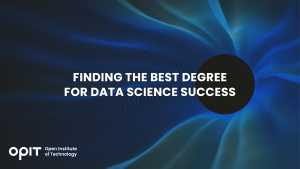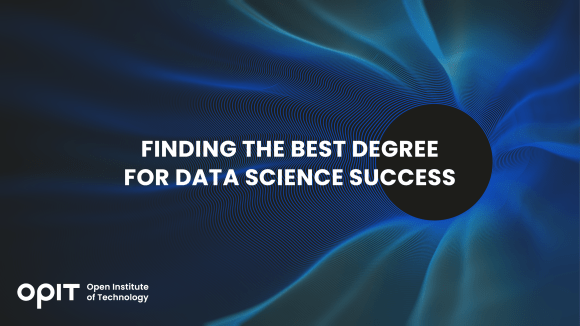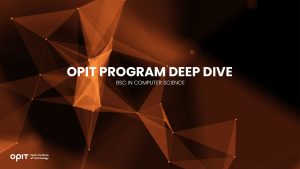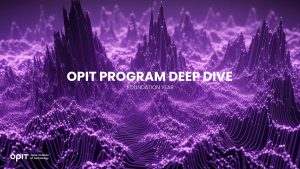

By 2025 the global data volume will approach 175 zettabytes. Store that information on DVDs and the stack would reach the moon 23 times over. That sheer volume of data means that professionals are required to make sense of the information.
Sectors like finance, healthcare, manufacturing, and telecoms use vast amounts of data and present attractive career opportunities. Choosing the best degree for data science can open up new doors for those interested in playing a leading role in the lucrative field of data science.
Understanding Data Science and Its Educational Pathways
Data science has always been important. Businesses have been leveraging the power of data ever since the term was invented, but the data landscape is changing.
Today, data science combines math and statistics, advanced analytics, specialized programming, Artificial Intelligence (AI), and machine learning to provide actionable strategic insights to organizations.
Aspirant professionals interested in playing a data-centric role in the success of an organization need appropriate, respected, and relevant qualifications, and finding the best degree for data science is the first step on the road to success.
That road offers many routes toward success in the individual’s chosen field.
Some data science career trajectories include:
- Data scientist
- Data analyst
- Business analyst
- Business intelligence analyst
Mid-Level
- Data architect
- Data engineer
- Senior business analyst
Senior-Level
- Lead data scientist
- Director of data science
- Vice president of data science
- Chief information officer
- Chief operations officer
What to Look For in a Data Science Degree
A firm foundation is essential for a rewarding career in data science, and that foundation must include a recognized undergraduate degree. The best degree for data science will be obtained from an accredited and well-respected education institution. It will provide foundational skills in areas such as data analysis, machine learning, big data, and statistical analysis (among others).
However, the structure of the coursework is important. An undergraduate degree in data science should:
- Provide a solid understanding of principles and theory
- Offer practical experience based on real-world immersion
- Give opportunities for specialization
In addition, a world-class program will emphasize teamwork, innovation and effective communication and offer the chance to make industry connections.
Best Degree for Data Science: Which One Should You Choose?
Navigating the sometimes murky waters of higher education can be a daunting task, especially when it comes to choosing the best degree for data science, but here are some well-respected choices.
1. M.S. In Data Analytics – Franklin University
This online qualification will equip the professional with the statistical skills required to conduct descriptive and predictive analytics. It also provides the programming skillset necessary to create and apply computer algorithms and the tools and platforms to visualize and mine big data. Students can expect to complete the coursework in around 19 months.
2. Bachelor of Science in Industrial Systems Data Analytics – Lakeland University
The strength of this qualification from Lakeland is its focus on both programming and data management. The flexibility of the on-campus/online program makes it a very attractive option for those who already hold a 9-5 job. This program provides students with essential skills in programming, statistics, data analysis, and visualization.
3. Bachelor of Science in Data Analytics – Southern New Hampshire University
Although this is an online course, the experience of using advanced analytical tools to solve real-world challenges will provide potential employers with peace of mind. Also on offer is a focus on project management, which is essential given the complexities of data-driven projects. Focus areas include data analytics, computer science, and computer programming. The course should take four years to complete, although online delivery allows students to graduate more quickly
4. Bachelor of Science in Computer Science – Full Sail University
This program focuses on data structure and system design. The online and on-campus study option means that students can finish the coursework in less than 80 weeks. Focusing on core competencies such as computer science, computer programming, and data science, it is the perfect qualification for those entering the potentially rewarding world of data science.
5. Bachelor of Science in Data Analytics – Lynn University
The 100% online undergraduate qualification in data analytics can be completed in four years or less. Coursework includes business analytics, advanced business techniques, data programming, and data mining. With a focus on real-world solutions, this is a program that will pay dividends in increased employability in a highly competitive environment.
OPIT’s Bachelor’s and Master’s Programs in Data Science
OPIT’s Bachelor’s (BSc) in Modern Computer Science and Master’s Degrees (MSc) in Applied Digital Business and Applied Data Science & Artificial Intelligence have been designed with input from industry leaders and feature real-world application of the skills gained through study. This approach results in qualifications that are extremely attractive to potential employers.
The BSC in Modern Computer Science
The coursework of the six-term Bachelor’s in Modern Computer Science is delivered entirely using state-of-the-art platforms designed for ease of use and flexibility.
Both potential employers, academics, and industry professionals have had a hand in developing this degree. It aims to provide graduates with theoretical and practical 360-degree foundational skills, including such coursework as programming, software development, database development and functionality. Students will also dive into more complex topics like cloud computing, cybersecurity, data science, and the ever-more important subject of Artificial Intelligence.
The MSC in Applied Digital Business and Applied Data Science & Artificial Intelligence
The 12–18 month Master’s Degree (MSc) in Applied Digital Business from OPIT supplies students with the knowledge and skills to tackle real-world challenges in technology, digitalization, and business. Coursework includes strategically orientated subjects such as digital transformation, digital finance, entrepreneurship, and digital product management. Students will also explore real-world applications with a capstone project and dissertation based on a real-world case study.
The 12-18 month Master’s in Applied Data Science & Artificial Intelligence is at the cutting edge of data science specialization. Online delivery of coursework means that students have incredible flexibility and can complete coursework at their own pace, a boon for busy professionals. Like other OPIT Master’s courses, this program emphasizes foundational principles and courses with content applicable to real-world challenges that can be analyzed using data science and AI. Coursework includes business principles, data science, machine learning, and Artificial Intelligence.
Why Consider OPIT for Your Data Science Education?
OPIT’s affordable, fully accredited, and internationally recognized degrees leverage knowledge from leading academics and industry leaders. This ensures the most relevant course content and resources, all delivered via cutting-edge online platforms. The institute’s flexible scheduling, the blend of theoretical and practical knowledge, and hands-on experience deliver an educational experience unlike any other available today.
The Future of Data Science and the Role of Education
The amount of data that has to be gathered, stored and analyzed by businesses is growing exponentially. This has fueled increasing demand for skilled and qualified data scientists. Employers are looking for the best of the best, and one of the time-proven ways to stand out from the crowd is by obtaining a recognized and respected qualification – the best degree for data science.
Of course, the learning doesn’t stop at one degree. Data science pioneers know the importance of lifelong learning and staying abreast of the latest methodologies, trends, and advancements.
A Data Science Degree – Making the Right Choice
Choosing the best degree for data science can be a challenge, but that challenge becomes manageable when one whittles down the choices. Make sure that the education provider you choose has impeccable credentials and a good reputation. Both of these are based on the delivery of exceptional course content that focuses on both theory and real-world experience.
Employers want graduates who can hit the ground running. Choosing a degree from OPIT means that the employee can start adding real value to organizational strategy from Day 1, and that is what employers want.
Related posts

Computer Science is fast becoming one of the most valuable fields of study, with high levels of demand and high-salaried career opportunities for successful graduates. If you’re looking for a flexible and rewarding way to hone your computing skills as part of a supportive global community, the BSc in Computer Science at the Open Institute of Technology (OPIT) could be the perfect next step.
Introducing the OPIT BSc in Computer Science
The OPIT BSc in Computer Science is a bachelor’s degree program that provides students with a comprehensive level of both theoretical and practical knowledge of all core areas of computer science. That includes the likes of programming, databases, cloud computing, software development, and artificial intelligence.
Like other programs at OPIT, the Computer Science BSc is delivered exclusively online, with a mixture of recorded and live content for students to engage with. Participants will enjoy the instruction of world-leading lecturers and professors from various fields, including software engineers at major tech brands and esteemed researchers, and will have many paths open to them upon graduation.
Graduates may, for example, seek to push on with their educational journeys, progressing on to a specialized master’s degree at OPIT, like the MSc in Digital Business and Innovation or the MSc in Responsible Artificial Intelligence. Or they could enter the working world in roles like software engineer, data scientist, web developer, app developer, or cybersecurity consultant.
The bullets below outline the key characteristics of this particular course:
- Duration: Three years in total, spread across six terms.
- Content: Core courses for the first four terms, a student-selected specialization for the fifth term, and a capstone project in the final term.
- Focus: Developing detailed theoretical knowledge and practical skills across all core areas of modern computer science.
- Format: Entirely online, with a mixture of live lessons and asynchronous content you can access 24/7 to learn at your own pace.
- Assessment: Progressive assessments over the course of the program, along with a capstone project and dissertation, but no final exams.
What You’ll Learn
Students enrolled in the BSc in Computer Science course at OPIT will enjoy comprehensive instruction in the increasingly diverse sectors that fall under the umbrella of computer science today. That includes a close look at emerging technologies, like AI and machine learning, as well as introductions to the fundamental skills involved in designing and developing pieces of software.
The first four terms are the same for all students. These will include introductions to software engineering, computer security, and cloud computing infrastructure, as well as courses focusing on the core skills that computer scientists invariably need in their careers, like project management, quality assurance, and technical English.
For the fifth term, students will have a choice. They can select five electives from a pool of 27, or select one field to specialize in from a group of five. You may choose to specialize in all things cybersecurity, for example, and learn about emerging cyber threats. Or you could focus more on specific elements of computer science that appeal to your interests and passions, such as game development.
Who It’s For
The BSc in Computer Science program can suit a whole range of prospective applicants and should appeal to anyone with an interest or passion for computing and a desire to pursue a professional career in this field. Whether you’re seeking to enter the world of software development, user experience design, data science, or another related sector, this is the course to consider.
In addition, thanks to OPIT’s engaging, flexible, and exclusively online teaching and learning systems, this course can appeal to people from all over the globe, of different ages, and from different walks of life. It’s equally suitable for recent high school graduates with dreams of making their own apps to seasoned professionals looking to broaden their knowledge or transition to a different career.
The Value of the BSc in Computer Science Course at OPIT
Plenty of universities and higher education establishments around the world offer degrees in computer science, but OPIT’s program stands out for several distinctive reasons.
Firstly, as previously touched upon, all OPIT courses are delivered online. Students have a schedule of live lessons to attend, but can also access recorded content and digital learning resources as and when they choose. This offers an unparalleled level of freedom and flexibility compared to more conventional educational institutions, putting students in the driving seat and letting them learn at their own pace.
OPIT also aims not merely to impart knowledge through lectures and teaching, but to actually help students gain the practical skills they need to take the next logical steps in their education or career. In other words, studying at OPIT isn’t simply about memorizing facts and paragraphs of text; it’s about learning how to apply the knowledge you gain in real-world settings.
OPIT students also enjoy the unique benefits of a global community of like-minded students and world-leading professors. Here, distance is no barrier, and while students and teachers may come from completely different corners of the globe, all are made to feel welcome and heard. Students can reach out to their lecturers when they feel the need for guidance, answers, and advice.
Other benefits of studying with OPIT include:
- Networking opportunities and events, like career fairs, where you can meet and speak with representatives from some of the world’s biggest tech brands
- Consistent support systems from start to finish of your educational journey in the form of mentorships and more
- Helpful tools to expedite your education, like the OPIT AI Copilot, which provides personalized study support
Entry Requirements and Fees
To enroll in the OPIT BSc in Computer Science and take your next steps towards a thrilling and fulfilling career in this field, you’ll need to meet some simple criteria. Unlike other educational institutions, which can impose strict and seemingly unattainable requirements on their applicants, OPIT aims to make tech education more accessible. As a result, aspiring students will require:
- A higher secondary school leaving certificate at EQF Level 4, or equivalent
- B2-level English proficiency, or higher
Naturally, applicants should also have a passion for computer science and a willingness to study, learn, and make the most of the resources, community, and support systems provided by the institute.
In addition, if you happen to have relevant work experience or educational achievements, you may be able to use these to skip certain modules or even entire terms and obtain your degree sooner. OPIT offers a comprehensive credit transfer program, which you can learn more about during the application process.
Regarding fees, OPIT also stands out from the crowd compared to conventional educational institutions, offering affordable rates to make higher tech education more accessible. There are early bird discounts, scholarship opportunities, and even the option to pay either on a term-by-term basis or a one-off up-front fee.

The Open Institute of Technology (OPIT) provides a curated collection of courses for students at every stage of their learning journey, including those who are just starting. For aspiring tech leaders and those who don’t quite feel ready to dive directly into a bachelor’s degree, there’s the OPIT Foundation Program. It’s the perfect starting point to gain core skills, boost confidence, and build a solid base for success.
Introducing the OPIT Foundation Year Program
As the name implies, OPIT’s Foundation Program is about foundation-level knowledge and skills. It’s the only pre-bachelor program in the OPIT lineup, and successful students on this 60-ECTS credit course will obtain a Pre-Tertiary Certificate in Information Technology upon its completion. From there, they can move on to higher levels of learning, like a Bachelor’s in Digital Business or Modern Computer Science.
In other words, the Foundation Program provides a gentle welcome into the world of higher technological education, while also serving as a springboard to help students achieve their long-term goals. By mixing both guided learning and independent study, it also prepares students for the EQF Level 4 experiences and challenges they’ll face once they enroll in a bachelor’s program in IT or a related field.
Here’s a quick breakdown of what the OPIT Foundation Program course involves:
- Duration: Six months, split into two terms, with each term lasting 13 weeks
- Content: Three courses per term, with each one worth 10 ECTS credits, for a total of 60
- Focus: Core skills, like mathematics, English, and introductory-level computing
- Format: Video lectures, independent learning, live sessions, and digital resources (e-books, etc.)
- Assessment: Two to three assessments over the course of the program
What You’ll Learn
The OPIT Foundation Program doesn’t intensely focus on any one particular topic, nor does it thrust onto you the more advanced, complicated aspects of technological education you would find in a bachelor’s or master’s program. Instead, it largely keeps things simple, focusing on the basic building blocks of knowledge and core skills so that students feel comfortable taking the next steps in their studies.
It includes the following courses, spread out across two terms:
- Academic Skills
- Mathematics Literacy I
- Mathematics Literacy II
- Internet and Digital Technology
- Academic Reading, Writing, and Communication
- Introduction to Computer Hardware and Software
Encompassing foundational-level lessons in digital business, computer science, and computer literacy, the Foundation Program produces graduates with a commanding knowledge of common operating systems. Exploring reading and writing, it also helps students master the art of communicating their ideas and responses in clear, academic English.
Who It’s For
The Foundation Year program is for people who are eager to enter the world of technology and eventually pursue a bachelor’s or higher level of education in this field, but feel they need more preparation. It’s for the people who want to work on their core skills and knowledge before progressing to more advanced topics, so that they don’t feel lost or left behind later on.
It can appeal to anyone with a high school-level education and ambitions of pushing themselves further, and to anyone who wants to work in fields like computer science, digital business, and artificial intelligence (AI). You don’t need extensive experience or qualifications to get started (more on that below); just a passion for tech and the motivation to learn.
The Value of the Foundation Program
With technology playing an increasingly integral role in the world today, millions of students want to develop their tech knowledge and skills. The problem is that technology-oriented degree courses can sometimes feel a little too complex or even inaccessible, especially for those who may not have had the most conventional educational journeys in the past.
While so many colleges and universities around the world simply expect students to show up with the relevant skills and knowledge to dive right into degree programs, OPIT understands that some students need a helping hand. That’s where the Foundation Program comes in – it’s the kind of course you won’t find at a typical university, aimed at bridging the gap between high school and higher education.
By progressing through the Foundation Program, students gain not just knowledge, but confidence. The entire course is aimed at eliminating uncertainty and unease. It imbues students with the skills and understanding they need to push onward, to believe in themselves, and to get more value from wherever their education takes them next.
On its own, this course won’t necessarily provide the qualifications you need to move straight into the job market, but it’s a vital stepping stone towards a degree. It also provides numerous other advantages that are unique to the OPIT community:
- Online Learning: Enjoy the benefits of being able to learn at your own pace, from the comfort of home, without the costs and inconveniences associated with relocation, commuting, and so on.
- Strong Support System: OPIT professors regularly check in with students and are on hand around the clock to answer queries and provide guidance.
- Academic Leaders: The OPIT faculty is made up of some of the world’s sharpest minds, including tech company heads, experienced researchers, and even former education ministers.
Entry Requirements and Fees
Unlike OPIT’s other, more advanced courses, the Foundation Program is aimed at beginners, so it does not have particularly strict or complex entry requirements. It’s designed to be as accessible as possible, so that almost anyone can acquire the skills they need to pursue education and a career in technology. The main thing you’ll need is a desire to learn and improve your skills, but applicants should also possess:
- English proficiency at level B2 or higher
- A Secondary School Leaving Certificate, or equivalent
Regarding the fees, OPIT strives to lower the financial barrier of education that can be such a deterrent in conventional education around the world. The institute’s tuition fees are fairly and competitively priced, all-inclusive (without any hidden charges to worry about), and accessible for those working with different budgets.
Given that all resources and instruction are provided online, you can also save a lot of money on relocation and living costs when you study with OPIT. In addition, applicants have the option to pay either up front, with a 10% discount on the total, or on a per-term basis, allowing you to stretch the cost out over a longer period to ease the financial burden.
Have questions?
Visit our FAQ page or get in touch with us!
Write us at +39 335 576 0263
Get in touch at hello@opit.com
Talk to one of our Study Advisors
We are international
We can speak in:


